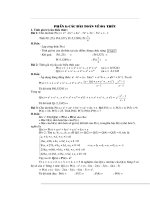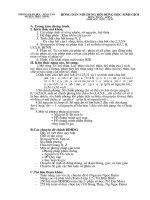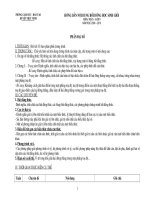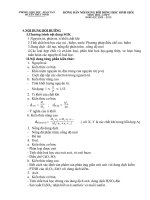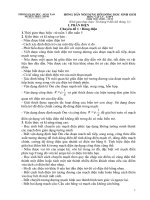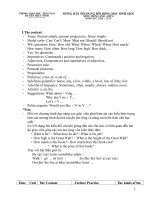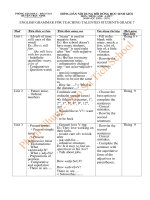Hướng dẫn nội dung bồi dưỡng HSG môn Anh 8
Bạn đang xem bản rút gọn của tài liệu. Xem và tải ngay bản đầy đủ của tài liệu tại đây (273.52 KB, 15 trang )
Phßng gi¸o dôc - ®µo t¹o
huyÖn trùc ninh
Híng dÉn néi dung båi dìng häc sinh giái
M«n: tiÕng anh - Líp 8
N¨m häc 2009 – 2010
UNIT 1 : MY FRIENDS
1.PRESENT SIMPLE TENSE
2. ATTRIBUTIVE AND PREDICATIVE ADJECTIVES
a. Attributive adjectives
The new secretary doesn’t like me.
He is a rich businessman.
b. Predicative adjectives
The baby is asleep.
He looks afraid.
3. ENOUGH
Subject + be (+not) + adjective + ENOUGH + to-infinitive
She is old enough to do what she wants.
Subject + verb + ENOUGH + noun(s) + to-infinitive
Are there enough potatoes to make potato soup?
UNIT 2 : MAKING ARRANGEMENTS
1. NEITHER . . . NOR
My father neither smokes nor drinks
2. BE GOING TO
Subject + be (am/is/are) + going to + verb (inf. Without to)
A. Talk about intentions
We are going to spend out holiday in Florida this year
B. Make predictions
Look at the sky! It’s going to rain
3. ADVERBS OF PLACES
Here, there , outside , inside , upstairs , downstairs , around , in London, out of the window . . .
- The children are playing upstairs
- Come and sit here
UNIT 3 : AT HOME
1. REFLEXIVE PRONOUNS
myself yourself himself herself itself ourselves yourselves themselves
By + REFLEXIVE PRONOUN= alone
He lives by himself in that large house = He lives alone in that house
2. Modal verbs: MUST, HAVE TO, OUGHT TO
3. WHY - BECAUSE
- Why
Why + auxiliary verb + subject . . . ?
Why were you late this morning?
-Because
BECAUSE + CLAUSE ( SUBJECT + VERB )
BECAUSE OF + ADJECTIVE + NOUN
Ex : He is absent because he is sick . <=> He is absent because of his sickness.
Ex : Because it rained heavily, they didn’t go to work.
<=> Because of the heavy rain, they didn’t go to work.
UNIT 4: OUR PAST
1. PAST SIMPLE TENSE
2. PREPOSITIONS OF TIME
IN ON AT AFTER BEFORE BETWEEN
3. USED TO
Subject + used to + verb (bare-infinitive)
I used to go fishing when I was a kid
Trong câu phủ đònh và câu hỏi, ta dùng trợ động từ did
She didn’t use to like opera, but now she like it.
Did you used to go there?
Lưu ý: Used to không có dạng hiện tại. Để nói về thói quen hay tình trạng ở hiện tại, ta thường
dùng thì hiện tại đơn (simple present tense)
UNIT 5 : STUDY HABITS
1. ADVERBS OF MANNER
Adjective + ly = Adverb
Bad -> badly happy-> happily beautiful -> beautifully
Soft -> softly quick -> quickly careful -> carefully
Một số trường hợp đặc biệt:
Good-> well fast -> fast early -> early Hard-> hard late-> late
2. MODAL VERB : SHOULD
3. COMMANDS, REQUESTS AND ADVICE IN REPORTED SPEECH
A. COMMANDS AND REQUESTS IN REPORTED SPEECH:
Subject + asked/told + Object + (not) + to infinitive
Dùng các động từ mở đầu asked , told , ordered , requested . . .
He said, “Can you meet me after class?”
-> He asked me to meet him after class
“Don’t leave your room, Tom” she said
-> She told Tom not to leave his room.
The policeman said, “Please show me your driving licence.”
-> The policeman ordered me to show him my driving licence.
B. ADVICE IN REPORTED SPEECH
Said / told (+that) + subject + should + bare infinitive
“You should stop smoking”, he said.
-> He said/told (that) I should stop smoking.
“You shouln’t drive so fast, John” he said
-> He said/told (that) John shouldn’t drive so fast.
UNIT 6 : THE YOUNG PIONEERS CLUB
1. PRESENT SIMPLE WITH FUTURE MEANING
2. GERUND
Formation: V-ING
Functions:
-Subject (S): Fishing is hishobby.
Getting into the city centre at this time of day isn t easy.’
-Complement (C): (of to be) Her passion is studying.
What we really want is escaping from this terrible place.
-Compound nouns:
+ Gerund-noun: fishing-rod cooking-apple driving licence
wrapping paper writing paper cooking oil
+ Non-gerund: fruit-picking sky-diving bush walking time counting
-Object (O):
Direct objects: Follow these certain verbs
admit avoid appreciate begin consider
continue delay Deny enjoy escape
finish keep mention mind postpone
prefer miss practice quit recall
report resent Resist recollect resume
rish
suggest…
-Verb preposition:
Approve of Appologize for Believe in Count on Care for
Complain of Cofess to Consist of Depend on Dream of
End in Give up Get to Forget about Go back to
Hesitate about Insist on Keep on Lead to Long for
Mean by Persist in Plan on Put off Rely on
Return to Result in Safe from Succeed in Think about
Think of Take to Threaten
with
Worry about Object to
Look forward to….
-Adjective preposition:
Absorbed in Accustomed to Afraid of Amused at Angry with
Annoy at Ashamed of Aware of (in)capable of Careful about
Careful in Careless of Certain about Clever at (un)concious of
Content with Delighted at Different from Ambarrassed at Excited about
Far from Fond of Fortunate in Frightened of Furious at
Given to Good at Grateful for Happy in (at) Intent on
Interested in Keen on Nice about Proud of Pleased at
Responsible
for
Right in Scared at (of) Set on Sick of
Skilled in (at) Slow in Sorry for Successful in (at) Sure of
Surprised at Thankful for Tired of (from) Upset at Worried about
Wrong in…
-Phrases: (phrases of words that have literal meanings)
1. can t bear; can t face; can t stand; can t help; feel like’ ’ ’ ’ ….
2. It s no use.../ It s (not) worth’ ’ …/…
Adjectives:
amusing comfortable difficult easy Great
hopeless lovely Nice off Pleasant
strange useless
wonderful…
Noun preposition:
Choice of Excuse for Possibility of Intention of Reason for
Method for…
Complement of objects: Follow these below verbs
call catch Feel discover Find
hear get imagine keep Leave
notice send Set stop
watch…
Subjunctive subject “it“ or noun phrases;
3. Find/ found + it + V-ING: He found the film annoying.
4. When/ on /while / as + V-ING: When opening the case, he found his lost notebook.
While checking the case, we found banned drugs.
3. MODALS : MAY, CAN, COULD
A. Can, could : making polite requests
Can you wait a moment, please?
Could you help me carry this bag?
B. May : offering assistance
May I help you ?
May I help you with the washing-up ?
UNIT 7 : MY NEIGHBORHOOD
1. PRESENT PERFECT TENSE
2. THE PRESENT PERFECT USED WITH FOR AND SINCE
3.COMPARISON WITH LIKE; (NOT) THE SAME AS; DIFFERENT FROM;
(NOT) AS . . . AS
4. TOO . . .TO (QUÁ. . . .KHÔNG THỂ)
Subject + be + too + adj (+for + object) + to infinitive
She is too tired to walk
Unit 8 : COUNTRY LIFE AND CITY LIFE
1. Present progressive tense
2. COMPARISON
A / SUPERIOR COMPARISON WITH SHORT ADJECTIVE AND ADERB
S
1
+ V + ADJECTIVE + ER + THAN + S
2
ADVERB
Ex : Alice is taller than Daisy.
B / SUPERIOR COMPARISON WITH LONG ADJECTIVE AND ADERB
S
1
+ V + MORE + ADJECTIVE + THAN + S
2
ADVERB
Ex : She is more beautiful than I.
Ex : They are more careful than we.
Ex : They drive more dangerously than we.
V / SUPERLATIVES
10. SHORT ADJ/ADV + EST
S + V + THE + MOST + LONG ADJ/ADV + IN + N( đếm được số ít) /
LEAST + ADJ / ADV OF + Nø(đếm được số nhiều)
Ex : John is the tallest boy in the family.
Ex : Mary is the shortest of the three sisters.
* EXCEPTIONAL CASES
1. good/ well better the best
2. bad/ badly worse the worst
3. many much more the most
4. little less the least
5. far farther the farthest
further the furthest
6. near nearer the nearest
the next
7. late later the latest
the last
8. old older the oldest
elder the eldest
Unit 9 A FIRST AID COURSE
1.Phrases of purpose
a. To-infinitive, in order to hoặc so as to
to-infinitive
in order to + verb (bare-inf.)
so as to + verb (bare-inf.)
He went to France to study French
She arrived early in order to get a good seat.
b.phuû ñònh “in order not to” “so as not to”
She got up early in order not to miss the first bus
I am going to leave now, so as not to be late
2. Future simple tense
3. Modal verbs will to make requests, offers and promises
Unit 10 : RECYCLING
1. PASSIVE FORMS
2. Adjectives followed by an infinitive or a noun clause
a. To infinitive
I’m very pleased to see you here
-It + be + adjective + to infinitive
It’s difficult to learn Japanese
b. Noun clause (That clause)
Subject + be + adjective + noun clause (that clause)
I am delighted that you pass your exam
UNIT 11 : TRAVLING AROUND VIETNAM
1. The participles
a. Present participle:Verb + ing
The man who is standing over there is my teacher
-> The man standing over there is my teacher
Students who attend thic scholl have to wear uniform
-> Students attending this school have to wearuniform
b. Past participle : Verb + ed/Werb 3
The toys which were made in China are cheap
-> The toys made in China are cheap
Most of the people who were invited to the party didn’t turn up
-> Most of the people invited to the party didn’t turn up
2. Request with Would / Do you mind. . . ?
a. would/do you mind + verb-ing. . . ?
Would/do you mind opening the window? (=Please open the window)
Would / do you mind not smoking ? (=please don’t smoke)
b. would you mind + if-clause (past tense) ?
Would you mind if I opened the window?
-Do you mind + if-clause (present tense) ?
Do you mind if I smoke?
